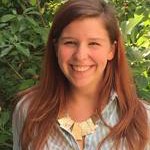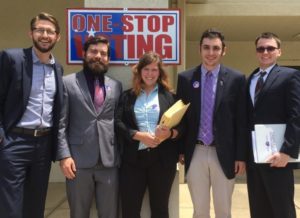This story/opinion was published in ForbesBrandVoice on Oct. 12, 2017.

Joanna Woodson, WCU student and Andrew Goodman Ambasador.
Western Carolina University (WCU), my beautiful campus tucked away in a Blue Ridge valley, had high expectations for the 2016 election. The civic engagement team I led as a student coordinator hoped for a 10-24% increase in student voter turnout; and, until recently, we believed it was a goal firmly rooted in the realm of possibility. Though our civic engagement team is dispirited with the results our campus received, ours provides an excellent case study for the power of numbers and storytelling.
In 2016, the newly-formed civic engagement team—comprised of administrators, faculty from across campus, the marketing department, student affairs, academic affairs, residential living, on-and-off-campus organizations both local and national, the Board of Elections, and, of course, students—put their shoulders to the wheel to create a cultural shift to get more students engaged in the political process. On a politically-sleepy campus, we aimed to move mountains. In 2015, there was no natural form of civic infrastructure, but by mid-2016 the university had become a national example of a civically-engaged campus. Times were so exciting that I boldly declared we were aiming for a 75% student turnout in November—turnout that would have amounted to a 24% increase over our 2012 presidential election rate. Realistically, the team as a whole hoped for a 10% increase.

Part of the team behind establishing the voting place at the University Center at WCU before the 2016 elections. Photo courtesy of Joanna Woodson.
But as we found in the newly-released National Study of Learning, Voting, and Engagement (NSLVE) report, our campus not only did not reach our 10-24% goal, we dropped almost 5% from 2012. We were sick when we received the report, and I certainly waded through Kübler-Ross’ stages of grief. Seven percent fewer women showed up to vote, and men dropped by 3%. Every racial bloc declined except those who identify as Asian—whose vote increased 9%. African American voters maintained their status as one of the highest rates of voters, at 40%—but unfortunately this was a drop of almost 15%.
Perhaps most shockingly, every field of study decreased from 2012, except computer and information sciences and engineering. Journalism / Communications saw a decline of 10%, health professions declined 6%, and Parks & Rec / Natural Resources saw a total drop of almost 9%. Based on the rhetoric that was tossed around during the campaign season, the people who had the most at stake in this election, it seems, are the ones who stayed home.
After the shock had time to settle, the team began to examine what happened—because this is not a WCU problem, this is everyone’s problem. And this isn’t a deficiency of collegiates—it’s part of the referendum on our state of democracy. If students don’t see themselves reflected in their government, what incentivises them to vote? If they don’t believe a vote would also help them manage or rid themselves of student debt, what use is a perceived abstract vote to begin with? And how do we actually address that effectively? And what actually is a cultural shift?
We need these numbers and analyses to observe how elections unfold, but we also need stories. I believe in the power of storytelling to bring people together, and in its ability to help us work through disengagement. All people know what it’s like to experience pain—it doesn’t matter how old you are, or how civically engaged you may or may not be, heartache doesn’t discriminate. So why do so many students not link the two—voting and heartache? Or what about the reverse—why don’t we link joyousness and voting? What if taking control of our collective destiny were as reliably enjoyable as eating the most delicious food? What would that look like? What could that look like?
These are tired questions, but with each election, it becomes more apparent that more questions and stories are needed. If you work at a university experiencing this sting, I encourage you to reach out to me so we can start a dialogue. Moreover, I encourage you, if you have already signed up and received your NSLVE data, to analyze it carefully, and to publish it publicly. College and university campuses is where this work can start, but embracing the sting of imperfection must come first.
Joanna Woodson is a senior studying social work at WCU. She believes in the power of the people, as well as the inherent dignity of all people. Joanna hopes one day to use her social work degree along side a law degree to help in the pursuit of justice. She became an Andrew Goodman Foundation fellow in January 2016.



